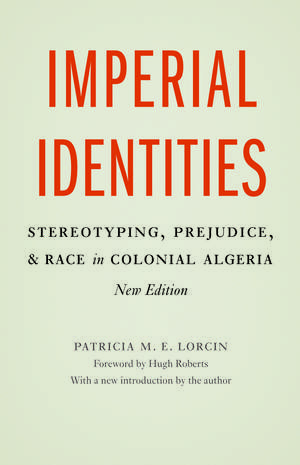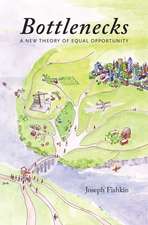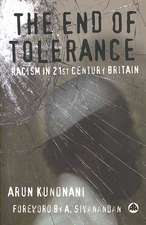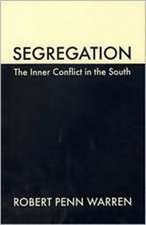Imperial Identities: Stereotyping, Prejudice, and Race in Colonial Algeria, New Edition
Autor Patricia M. E. Lorcin Cuvânt înainte de Hugh Robertsen Limba Engleză Paperback – 31 aug 2014
In this new edition of Imperial Identities, Lorcin addresses the related scholarship that has appeared since the book’s original publication, looks at postindependence issues relevant to the Arab/Berber question, and discusses the developments in Algeria and France connected to Arab/Berber politics, including the 1980 Berber Spring and the 1992–2002 civil war. The new edition also contains a full and updated bibliography.
Preț: 219.43 lei
Nou
Puncte Express: 329
Preț estimativ în valută:
41.99€ • 43.68$ • 34.67£
41.99€ • 43.68$ • 34.67£
Carte tipărită la comandă
Livrare economică 14-28 aprilie
Preluare comenzi: 021 569.72.76
Specificații
ISBN-13: 9780803249714
ISBN-10: 0803249713
Pagini: 394
Ilustrații: 1 map
Dimensiuni: 140 x 216 x 27 mm
Greutate: 0.48 kg
Ediția:Nouă
Editura: Nebraska
Colecția University of Nebraska Press
Locul publicării:United States
ISBN-10: 0803249713
Pagini: 394
Ilustrații: 1 map
Dimensiuni: 140 x 216 x 27 mm
Greutate: 0.48 kg
Ediția:Nouă
Editura: Nebraska
Colecția University of Nebraska Press
Locul publicării:United States
Notă biografică
Patricia M. E. Lorcin is a professor of history at the University of Minnesota and the author of numerous books, including Historicizing Colonial Nostalgia, Algeria and France 1800–2000, and France and Its Spaces of War.
Hugh Roberts is the Edward Keller Professor of North African and Middle Eastern History at Tufts University and the author of Berber Government: The Kabyle Polity in Pre-Colonial Algeria.
Hugh Roberts is the Edward Keller Professor of North African and Middle Eastern History at Tufts University and the author of Berber Government: The Kabyle Polity in Pre-Colonial Algeria.
Cuprins
Foreword by Hugh Roberts
Introduction to the Nebraska Edition
Acknowledgments
Introduction to the Nebraska Edition
Acknowledgments
Introduction
Part I. Algeria 1830-1870
1. The conquest: Kabyles and Arabs in warfare
2. Security and reconnaissance part 1: the elaboration and confirmation of categories
3. Security and reconnaissance part 2: Islam and society
4. The 'Royaume Arabe' (1860-1870)
Part II. Social sciences and military men
5. The Ecole Polytechnique, Saint-Simonianism and the army
6. Race and scholarship in Algeria: the impact of the military
7. Scholarly societies in France: the Kabyle Myth as a racial paradigm
Part III. Algeria 1871-1900: The eclipse of the Kabyle Myth
8. Civilian rule
9. Algeria, the melting-pot of the Mediterranean: the impact of Louis Bertrand
Part IV. The legacy
10. Persistent stereotypes and resultant policies
Part V
11. Conclusion
Notes to chapters
Appendix: Biographical sketches
Bibliography
Index
Recenzii
"Lorcin's excellent intellectual history investigates in great depth the French colonial 'Kabyle Myth' and the 19th-century development of racial stereotypes. . . . Lorcin's highly recommended book also serves anthropological, ethnological, and sociological studies of imperialism."--Choice
"[Imperial Identities] is essential reading for any student of Maghreb history and important in its conclusions. . . . Lorcin's sources are rich and varied, scrupulously referenced. . . . Enjoyable to read as well as being most enlightening."--Anthony Clayton, Journal of Imperial and Commonwealth History
“Lorcin’s study of the formulation and manipulation of imperial identities is a masterpiece of the genre and makes a significant contribution to Algerian history, to nineteenth-century French intellectual history, and to the broader history of imperialism.”—John Ruedy, Journal of Middle East Studies
“Sets new standards for research in both colonial and intellectual history. . . . Imperial Identities would already be important if it merely showed how the Kabyle Myth came into existence, but that is not where Lorcin stops her inquiry, and this is why her work is certain to leave a lasting mark on the field.”—James Le Sueur, Journal of Modern History
"Lorcin's persuasive and well-written account of the historical development of [postcolonial] attitudes adds much to our understanding."--William A. Hoisington Jr., Journal of Interdisciplinary History
“Lorcin’s exemplary study of the ‘Kabyle myth’ . . . provides striking evidence of the centrality of racial classification to modern colonialism.”—Daniel J. Sherman, French Historical Studies












